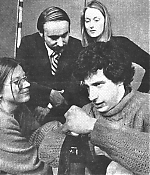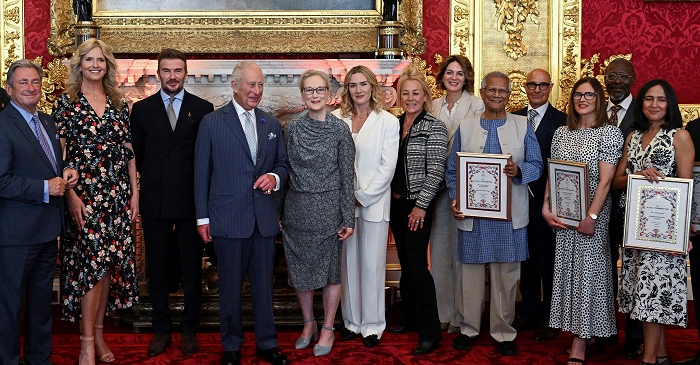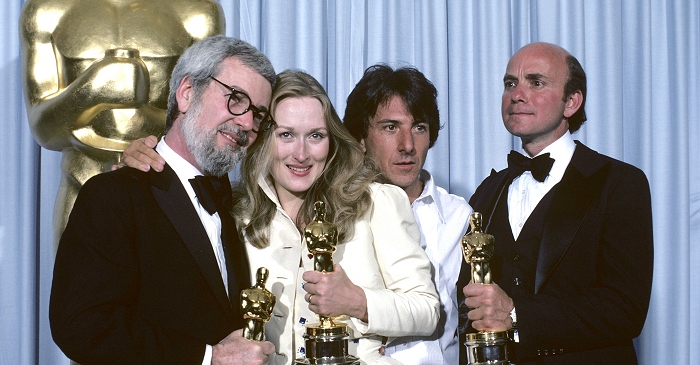|
Simply Streep is your premiere online resource on Meryl Streep's work on film, television and in the theatre - a career that has won her acclaim to be one of the world's greatest living actresses. Created in 1999, Simply Streep has built an extensive collection over the past 25 years to discover Miss Streep's body of work through thousands of photographs, articles and video clips. Enjoy your stay and check back soon.
|
Shearwater
March 10, 1973
· Yale Experimental Theatre
|

Directed by: Steve Robman
· Literature: William Hauptman

An original story by Charles Hauptman, Douglas Shearwater (Charles Levin) is an Englishman who has set out to circumnavigate the world alone in 1968. A year later his sailboat is found drifting empty, in the Atlantic. The action takes place in the cabin of his boat. Several flashbacks describe Shearwater's home life and the events surrounding his decision to sail around the world alone. Shearwater felt that his life was somehow wrong. And he went to sea to find the solitude to ask himself some basic (existential) questions about himself.
Cast & Characters
Selected Reviews
Yale Daily News, March 09, 1973, Henry Wiencek
“Shearwater” is based on the story of Donald Crowhurst, an Englishman who set out to circumnavigate the world alone in 1968. A year later his sailboat was found drifting empty, in the Atlantic. Hauptman has named his character Douglas Shearwater, and the action takes place in the cabin of his boat. There are also several flashbacks which describe Shearwater’s home life and the events surrounding his decision to sail around the world alone. Shearwater felt that his life was somehow wrong. And he went to sea to find the solitude to ask himself some basic (existential) questions about himself. Hauptman centered the play upon the image of a knot. Shearwater tied himself to a table in his cabin to safeguard against being washed over board in a storm. But when the storm abates he cannot untie the knot – it is too tangled. The finaly scene of the play consists only of the empty cabin, with the rope lying on the floor (the knot untied) and Shearwater presumably lost overboard. He unravelled his knot but by freeing himself he lost himself. In theatrical terms, the image is a good one, and “Shearwater” has the makings of a good play. The problem with the play is that it is not reall fully developed. Shearwater’s wife, the BBC newscaster, and Shearwater’s press agent are very sketchily drawn, yet they are important characters because they are foils to Shearwater himself. Hauptman made them out to be so patiently detestable that Shearwater’s flight from them becomes almost a comic situation. At any rate, the play loses a good deal of its seriousness in the flashbacks. Charles Levin is very good as Shearwater but he gets little support from the rest of the cast. Ronald Recasner, as the Sailor, is a bit too heavily made-up and too consciously oracular at times. Linda Atkinson, as the wife, labors with a poorly written part, and comes off as merely stupid. Meryl Streep and Joseph Costa are both adequate in their small parts, which also were not very well conceived by the writer. These shows, though flawed, are well worth seeing. Hauptman is an exciting playwright. The two plays of his that I have seen, “Shearwater” and “Heart” (produced last year) are surprisingly mature in their vision and indicate that we will be hearing from this writer quite a bit in the future.
“Shearwater” is based on the story of Donald Crowhurst, an Englishman who set out to circumnavigate the world alone in 1968. A year later his sailboat was found drifting empty, in the Atlantic. Hauptman has named his character Douglas Shearwater, and the action takes place in the cabin of his boat. There are also several flashbacks which describe Shearwater’s home life and the events surrounding his decision to sail around the world alone. Shearwater felt that his life was somehow wrong. And he went to sea to find the solitude to ask himself some basic (existential) questions about himself. Hauptman centered the play upon the image of a knot. Shearwater tied himself to a table in his cabin to safeguard against being washed over board in a storm. But when the storm abates he cannot untie the knot – it is too tangled. The finaly scene of the play consists only of the empty cabin, with the rope lying on the floor (the knot untied) and Shearwater presumably lost overboard. He unravelled his knot but by freeing himself he lost himself. In theatrical terms, the image is a good one, and “Shearwater” has the makings of a good play. The problem with the play is that it is not reall fully developed. Shearwater’s wife, the BBC newscaster, and Shearwater’s press agent are very sketchily drawn, yet they are important characters because they are foils to Shearwater himself. Hauptman made them out to be so patiently detestable that Shearwater’s flight from them becomes almost a comic situation. At any rate, the play loses a good deal of its seriousness in the flashbacks. Charles Levin is very good as Shearwater but he gets little support from the rest of the cast. Ronald Recasner, as the Sailor, is a bit too heavily made-up and too consciously oracular at times. Linda Atkinson, as the wife, labors with a poorly written part, and comes off as merely stupid. Meryl Streep and Joseph Costa are both adequate in their small parts, which also were not very well conceived by the writer. These shows, though flawed, are well worth seeing. Hauptman is an exciting playwright. The two plays of his that I have seen, “Shearwater” and “Heart” (produced last year) are surprisingly mature in their vision and indicate that we will be hearing from this writer quite a bit in the future.











